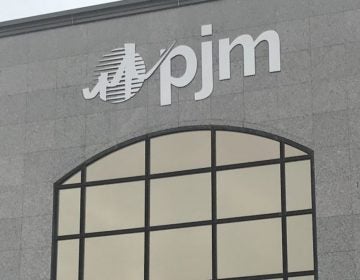Report: Deep budget cuts, emergency manager only way to save Atlantic City

Ruth Hardrick, a dealer who worked at Trump Plaza Hotel & Casino for 26 years, stands with friend, Anthony Powell, on The Boardwalk, as she answers a question after the casino closed early Tuesday, Sept. 16, 2014. (AP Photo/Mel Evans)
Virtually every aspect of Atlantic City, from the locus of fiscal authority and the number of police officers, to the scope of commercial development and the resort’s marketing strategy, would be revamped under a set of recommendations from a board tasked with figuring out how to fix the city’s fiscal mess.
Gov. Chris Christie on Wednesday gave a brief preview of a new report from the Governor’s Advisory Commission on New Jersey Gaming, Sports and Entertainment, particularly the recommendation that an emergency manager be imposed on the struggling seaside city to slash its excessive municipal and school budgets.
The report released today offers more details of the extensive and in some cases painful changes the commissioners say are necessary to prevent Atlantic City’s financial collapse, and to pave the way for its revival as a tourist destination focused on its boardwalk, beach, and entertainment venues rather than on the shrinking gambling industry. Four casinos have closed in 2014 and this year’s gaming revenues could be half of their peak amounts eight years ago.
The report is striking for its embrace of the harsh reality of gambling’s decline and the need to use tourism revenues to improve a community suffering from high unemployment and soaring tax bills. Chairman Jon Hanson and the other commissioners would tear down shuttered casinos to give better access to the boardwalk, broaden the geographic scope of development efforts, and redirect casino marketing funds to tax relief and a new redevelopment corporation.
“Revitalization efforts should be concentrated, not scattered within the Tourism District, which should be extended to include the entire city,” the chairman’s message reads. “The Atlantic needs to be put back into Atlantic City’s appeal as the city pivots away from reliance on the gaming industry.”
There is no guarantee that the changes will happen. The emergency manager, funding transfers, and some other measures will require legislative action. The manager proposal has already sparked resistance from Mayor Don Guardian, whose powers would presumably be curtailed. But Christie said some or all of the measures must be implemented if the city is to survive its crisis of plunging casino revenues, rising debt, and soaring tax rates. Senate President Stephen Sweeney (D-Gloucester) also backs several of the proposals.
Keeping Tax Revenues SteadyIn addition to creating the manager position, the commission recommends that the Casino Reinvestment Development Authority (CRDA) take over parts of city government, assuming responsibility for zoning, planning and code enforcement citywide and running redevelopment. The CRDA, which is funded by taxes on gaming revenues, has already sunk hundreds of millions of dollars into numerous projects, most recently a new conference center, Bass Pro shop, Steel Pier attraction, public market, and housing, but has not overseen city agencies.
Another recommendation, which resembles a proposal Sweeney made earlier this week, would create an alternative tax payment system for casinos. It would fix their payment for several years, preventing new tax appeals and big fluctuations in city tax revenues. The report notes that the Taj Mahal and the defunct Revel and Trump Plaza casinos owe a combined $30 million in unpaid taxes, and says casinos would have to be current on their taxes to qualify for the alternative tax payments.
The commission suggests a seven- to 10-year tax program, while Sweeney has proposed indexing payments to gaming revenues rather than business property valuations for 15 years, and setting total payments at $150 million for the first two years. The report also recommends a three-year tax freeze for nongaming properties.
As it seeks to stabilize taxes, the commission also attacks what Christie has called the “explosive cost” of government in Atlantic City. The city’s current budget is $262 million.
A prime target is the climbing cost of debt service, health insurance, and pensions. While spending on city departments like police, fire, and health and human services has remained relatively flat for at least nine years, nondepartmental spending increased by what the report calls a “staggering” 7.9 percent per year on average.
Casinos, facing falling profits, have repeatedly filed tax appeals and won refunds that the city has covered by borrowing. Some $345 million of bonds have been issued since 2010, and debt service represents 15 percent of the 2014 budget, the report says. Debt service has grown 71 percent and pension payments have climbed 139 percent over eight years.
Shifting Funds, Cutting CostsTo address the tax obligations directly, the commission would use money from the budgets of the Atlantic City Alliance (ACA) and the CRDA to cover some city costs. Some of those dollars would also fund a new nonprofit called the Atlantic City Development Corporation or ACDevCo, modeled on a similar organization in New Brunswick.
While the redirected money could go toward servicing the city’s debt, it should still be treated as a loan that the city would have to pay off, the report says.
Sweeney said the CRDA has a $25 million budget surplus that could be repurposed while allowing the agency to continue operating. But it appears that the three-year-old ACA, a marketing organization funded by an annual $30 million assessment on the casinos, would cease to exist in its current form if the commission’s recommendation is adopted.
“Atlantic City Alliance marketing has increased awareness and interest in Atlantic City, but return on investment is below expectations and does little to affect urgent structural needs of the city,” the report says. “The state should reappropriate these funds to help ease the burden of property taxes and fund … the Atlantic City Development Corp., with a mission more representative of the city’s pressing needs.”
An ACA spokeswoman referred questions about the organization’s future to board chairman Tom Ballance, president of the Borgata casino. He did not immediately respond to an email yesterday afternoon.
The city should also cut spending, in part by downsizing the police department from 330 to 285 uniformed officers, increasing the number of less well-paid part-time officers from 35 to 60. The commission also recommends reducing the number of firefighters from 261 to 180. Both reductions would save about $17 million a year.
The commissioners recommend regionalizing the police and fire services, as was done with the Camden police, saying that would cut costs by at least another $8 million. They project that a more-extensive county-level consolidation of public health and other services would save a total more than $25 million a year, but do not provide a breakdown of the savings.
Detail is also lacking on a recommendation that the new emergency manager be given the power to sharply reduce the school district budget, which amounted to $183 million in 2013, including $118 million from local taxes. The manager should reduce per-pupil costs from $26,000 to the statewide average of about $18,000, the report says, without explaining how the district could absorb such a massive cut.
The district should also receive “significantly” more state Equalization Aid, which aims to bridge school-funding gaps in poor communities, the commission says. Sweeney said the Atlantic City district has not been given such aid previously because it was receiving casino taxes. An aid amount is not specified, but the report says a cap limiting annual increases to 20 percent would have to be waived.
The report briefly addresses pension costs, saying pension-fund payments should be deferred for three years as a stopgap and lifeguard pension contributions should be waived indefinitely. To promote efficiencies at the state level, the Division of Gaming Enforcement and the Casino Control Commission should be consolidated on the Las Vegas model, the report says.
Ambitious Development GoalsWhile the report focuses more on balancing the books than on increasing revenues, the commission has also been considering a number of ways to boost the city’s economy.
They include the creation of ACDevCo, which would start off with $10 million a year of redirected ACA money for three years. The new nonprofit would function as a land bank, buying blighted properties, demolishing buildings, selling the land to developers, and reinvesting any profits.
“Demolition of certain failed casinos to create greenscapes, providing convenient access to the boardwalk and ocean by non-gambling visitors, could help re-orient the ‘new’ Atlantic City,” the report says.
In addition, extending the Tourism District to the whole city would allow the CRDA to expand the scope of its investments.
The report does not lay out the commission’s full development plan, but after attending a summit in Atlantic City with Christie and other officials on Wednesday, Mayor Guardian reportedly said it calls for creation of a medical school as part of the Geisinger AtlantiCare facility, demolition of Trump Plaza, a huge retail and restaurant project in the Gardner’s Basin area, and redevelopment of the city’s old high school site.
Stockton College already announced this week that it intends to turn the former Showboat casino into a branch campus.
The commissioners’ other ideas for increasing revenue and paying off city debt include leasing the city’s water utility to a private operator, making better use of Bader Field, opening music venues around the boardwalk, and allowing gambling at boutique hotels.
WHYY is your source for fact-based, in-depth journalism and information. As a nonprofit organization, we rely on financial support from readers like you. Please give today.




